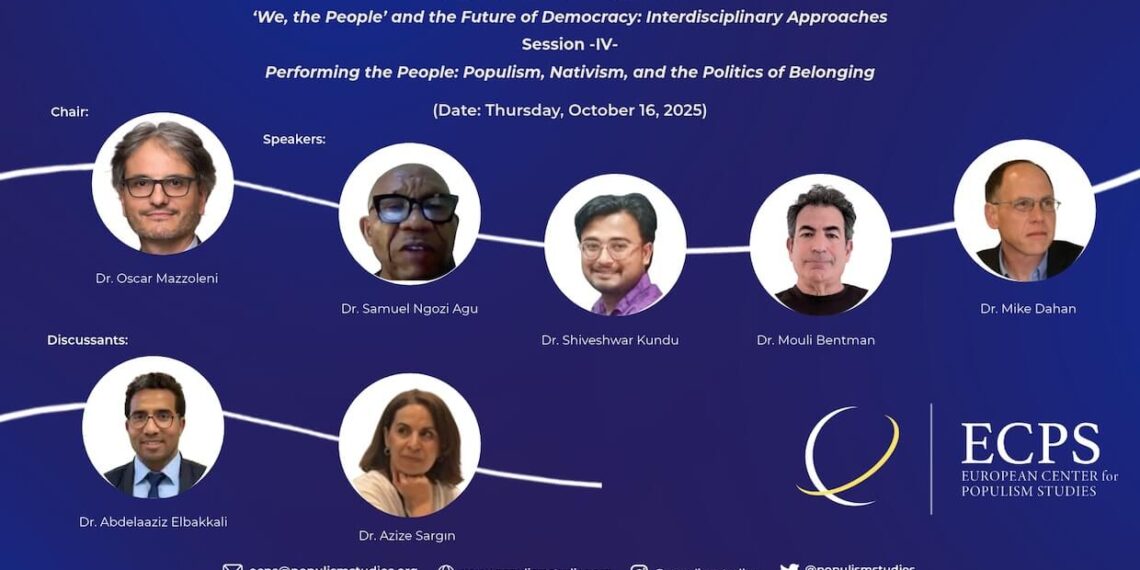On October 16, 2025, the ECPS held the fourth session of its Virtual Workshop Series “We, the People” and the Future of Democracy: Interdisciplinary Approaches.” The session examined how political actors construct and mobilize “the people” to legitimize both inclusive and exclusionary political projects. Chaired by Professor Oscar Mazzoleni, the session featured presentations by Samuel Ngozi Agu, Shiveshwar Kundu, and Mouli Bentman & Michael Dahan, each exploring different regional and theoretical perspectives. Abdelaaziz El Bakkali and Azize Sargın provided incisive discussant feedback, followed by a lively Q&A. Concluding reflections by Prof. Mazzoleni emphasized populism’s dual nature as both a political strategy and a symptom of structural democratic crises, setting the stage for future interdisciplinary debate.
Reported by ECPS Staff
On October 16, 2025, the European Center for Populism Studies (ECPS), in collaboration with Oxford University, convened the fourth session of its ongoing Virtual Workshop Series, titled “We, the People” and the Future of Democracy: Interdisciplinary Approaches. This series (September 2025 – April 2026) provides a structured forum for interdisciplinary dialogue on the contemporary challenges of democratic backsliding, populism, and the future of liberal democracy across different regions.
The fourth session, titled “Performing the People: Populism, Nativism, and the Politics of Belonging,” focused on how political actors construct and mobilize the idea of “the people” to reshape democratic imaginaries, often in ways that blur the line between inclusion and exclusion. Against a backdrop in which one-fifth of the world’s democracies disappeared between 2012 and 2024, the session explored the dual role of “the people” as both a democratic resource and a political instrument used to legitimize exclusionary, often authoritarian projects. The event brought together a diverse group of scholars and practitioners from India, Nigeria, Israel, Morocco, Switzerland, and beyond, reflecting the comparative and interdisciplinary scope of the series.
The session was chaired by Professor Oscar Mazzoleni (University of Lausanne). Following a welcome by Reka Koletzer on behalf of ECPS, Prof. Mazzoleni opened with a conceptual framing that situated the panel within broader debates on populism and democratic legitimacy. He emphasized that there is “no populism without the people,” tracing the notion’s roots to ancient Greece and its evolution as a key source of political legitimation.
Historically, he noted, when “the people” were not central, politics drew on divine authority. Today, however, democratic politics is increasingly intertwined with religion and sacralized notions of a homogeneous people—developments that pose serious challenges to the rule of law and democratic sustainability. Prof. Mazzoleni highlighted how populist leaders exploit these dynamics to consolidate power and reshape belonging, stressing the importance of contextual, cross-regional reflection—linking contributions from Africa, Asia, and the Middle East to global debates.
Three scholarly presentations followed, each addressing the theme from a distinct geographical and theoretical perspective: Dr. Samuel Ngozi Agu (Abia State University, Nigeria) presented “We, the People: Rethinking Governance Through Bottom-Up Approaches,” arguing for decentralization and participatory governance as democratic correctives to elite-dominated political systems. Dr. Shiveshwar Kundu (Jangipur College, University of Kalyani, India) delivered “The Idea of ‘People’ Within the Domain of Authoritarian Populism in India,” offering a psychoanalytic and structuralist interpretation of the rise of Hindu nationalist populism. Dr. Mouli Bentman and Dr. Mike Dahan (Sapir College, Israel) presented “We, the People: The Populist Subversion of a Universal Ideal,” examining how populist movements appropriate the universalist language of liberal democracy to undermine its institutions from within.
The presentations were followed by discussant feedback from Associate Professor Abdelaaziz Elbakkali (SMBA University, Morocco; Fulbright Postdoctoral Scholar, Arizona State University) and Dr. Azize Sargın (Director for External Affairs, ECPS). Their interventions offered comparative perspectives, theoretical reflections, and methodological suggestions, deepening the debate and encouraging the presenters to refine their arguments. A Q&A session allowed for interactive exchanges between the speakers and participants, further probing the conceptual, empirical, and normative implications of the presentations. Finally, Prof. Mazzoleni provided a general assessment, synthesizing the key insights of the session.
This report documents the presentations, discussants’ feedback, Q&A exchanges, and concluding reflections, offering a comprehensive overview of a rich and interdisciplinary scholarly discussion on how “the people” is performed, politicized, and contested in contemporary democratic politics.


